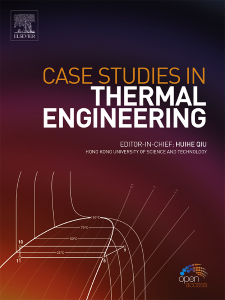A geothermal-based freshwater/cooling system assisted by heat recovery sections: 3E analysis and techno-economic optimization using genetic algorithm
IF 6.4
2区 工程技术
Q1 THERMODYNAMICS
引用次数: 0
Abstract
The proposed system uses a dual-loop organic Rankine cycle, a reverse osmosis desalination unit, an absorption cooling unit, and a thermoelectric generator to produce electricity and freshwater for urban areas. A thorough assessment of the system's thermodynamic and economic performance has been conducted, with a parameter-based investigation to assess the effect of key variables on the system performance. The parametric study indicates that rising the geothermal mass flow rate enhances the energy efficiency, but lowers the energy efficiency and affects the cooling requirements. Moreover, the optimum inlet temperature in turbine 1 increases the desalination efficiency up to 105.02 kg/s at 115 °C, and higher temperatures reduce the performance and system efficiency. Adjusting the temperature difference at the pinch point at Evaporator1 is crucial for system efficiency, with trade-offs between freshwater output, expenses, and exergy efficiency. The capability of the system to produce up to 6,048,000 L of potable water daily signifies a monumental leap towards meeting the water demands of nearly 42,000 individuals, based on European consumption standards. Lastly, the application of genetic algorithms in the optimization process results in an exergetic efficiency of 32.79 % and a cost rate of 58.05 $/h, demonstrating the system's enhanced operational effectiveness.
由热回收部分辅助的地热淡水/冷却系统:利用遗传算法进行 3E 分析和技术经济优化
拟议的系统采用双回路有机朗肯循环、反渗透海水淡化装置、吸收式冷却装置和热电发电机,为城市地区生产电力和淡水。对该系统的热力学和经济性能进行了全面评估,并通过参数调查评估了关键变量对系统性能的影响。参数研究表明,提高地热质量流量可提高能源效率,但会降低能源效率并影响冷却要求。此外,涡轮机 1 的最佳进水温度可提高海水淡化效率,在 115 ℃ 时最高可达 105.02 kg/s,而更高的温度则会降低性能和系统效率。调整蒸发器 1 夹点的温差对系统效率至关重要,需要在淡水产出、费用和放能效率之间进行权衡。根据欧洲消费标准,该系统每天可生产多达 604.8 万升饮用水,这意味着在满足近 42000 人的用水需求方面实现了巨大飞跃。最后,遗传算法在优化过程中的应用使系统的能效达到了 32.79%,成本率为 58.05 美元/小时,这表明系统的运行效率得到了提高。
本文章由计算机程序翻译,如有差异,请以英文原文为准。
求助全文
约1分钟内获得全文
求助全文
来源期刊

Case Studies in Thermal Engineering
Chemical Engineering-Fluid Flow and Transfer Processes
CiteScore
8.60
自引率
11.80%
发文量
812
审稿时长
76 days
期刊介绍:
Case Studies in Thermal Engineering provides a forum for the rapid publication of short, structured Case Studies in Thermal Engineering and related Short Communications. It provides an essential compendium of case studies for researchers and practitioners in the field of thermal engineering and others who are interested in aspects of thermal engineering cases that could affect other engineering processes. The journal not only publishes new and novel case studies, but also provides a forum for the publication of high quality descriptions of classic thermal engineering problems. The scope of the journal includes case studies of thermal engineering problems in components, devices and systems using existing experimental and numerical techniques in the areas of mechanical, aerospace, chemical, medical, thermal management for electronics, heat exchangers, regeneration, solar thermal energy, thermal storage, building energy conservation, and power generation. Case studies of thermal problems in other areas will also be considered.
 求助内容:
求助内容: 应助结果提醒方式:
应助结果提醒方式:


